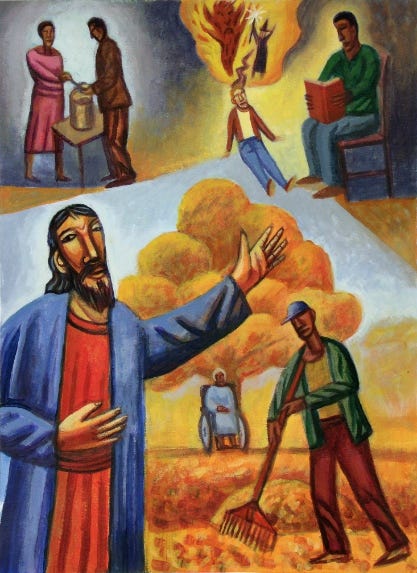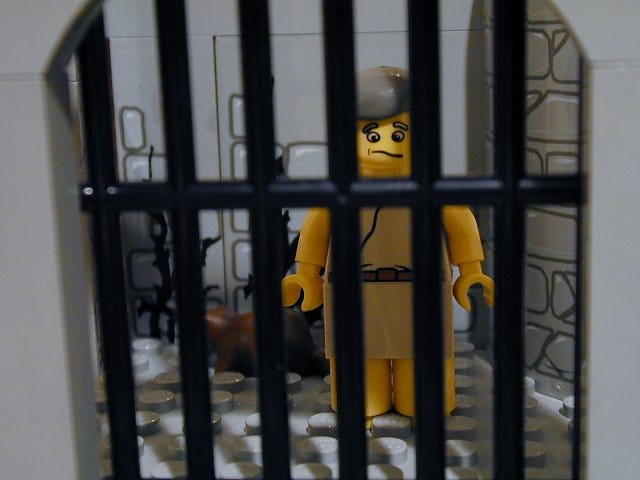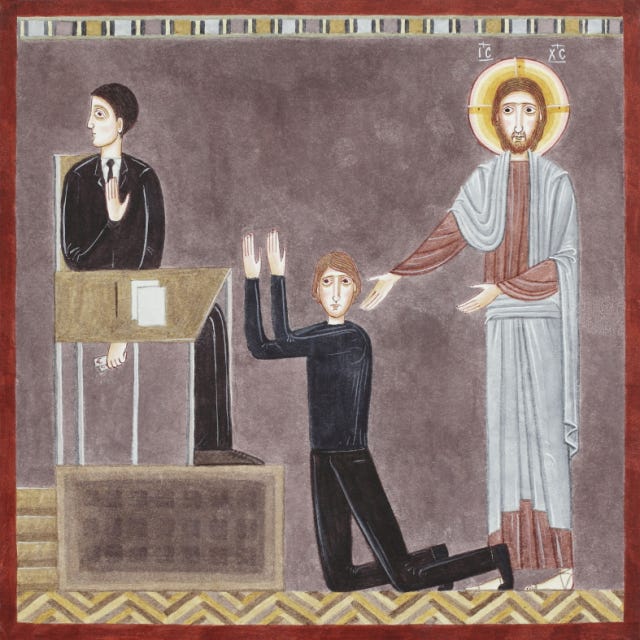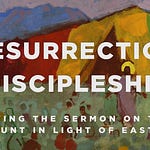Nothing tugs at our heartstrings like a story on the evening news of someone who had been greatly harmed or wronged extending forgiveness to their offender. These stories are typically highlighted toward the end of the evening newscast and serve as a dopamine pick-me-up that follows 30-plus minutes of doom and gloom. Person A does something that harms Person B. After being caught, booked, and prosecuted, Person B or their family forgives Person A. We all feel better about the world and will tune in the next night for another pick-me-up.
In June 2015, Dylan Roof entered Mother Emanuel AME Church in Charleston, SC, and attended a Bible study. The church welcomed him, and before he left, he killed nine people and injured another. Roof was arrested, processed, and appeared before a judge for a bond hearing. At the hearing, Nadine Collier, the daughter of one of Roof’s victims, said, “I forgive you. You took something very precious from me. I will never talk to her again. I will never, ever hold her again. But I forgive you.” Another family member of one of Roof’s victims said, “I acknowledge that I am very angry, but one thing that DePayne always enjoined in our family … is she taught me that we are the family that love built. We have no room for hating, so we have to forgive.” [i]
Hearing stories like this reminds us that in the face of Sin and Death, the grace of God is at work, even in situations where we are unsure if we can respond with forgiveness.
There was a king who wanted, for whatever reason, to settle his accounts. It was time to balance the books. One by one, his servants came before him to pay up. One servant who was brought before the king owed 10,000 talents. This is a debt that would take a lifetime and then some to repay, and the king is expecting full repayment.
We feel sorry for the servant, so our hearts are strangely warmed as the servant asks for pity and for the king to be patient. Then, without warning, with more pity than the servant expected, the king outright forgives the debt. A lifetime of debt is gone.
A debt-free servant sees a fellow servant who owes him money no more than a few minutes after leaving the king’s office. He demands what is owed. His fellow servant asks for pity and patience. He needs more time to repay what is owed. But in the mind of the loan shark servant, there is no time for pity, and he is out of patience. He has his indebted servant thrown in prison until the debt is repaid. And to think, we were on this guy’s side a few verses ago.

The king gets word of what has happened and sends the “wicked” servant to jail to be tortured until his debt is repaid. And Jesus says the Kingdom of God is somehow wrapped up in this.
Our world and economy are set up so that debts are paid. We do not want to see anyone get away with any wrong. If someone breaks the law, we are not interested in mandatory minimums. We want the book thrown at them. As the judge’s gavel falls with the judgment of “guilty,” we want the maximum sentence handed out. It’s like comedian Ron White says about the criminal justice system in Texas, “In Texas, if you kill someone, we’ll kill you back.”
The stories told by Jesus are called parables. Parables are earthly examples of heavenly truth. Through (not so) simple stories, Jesus paints a picture of how the Kingdom of God, the grace of God, and the judgment of God are different from the ways of the world.

Jesus was a talker; there’s no getting around that. As he traveled with his disciples, he taught about the Kingdom of God and how this kingdom would be different from the kingdom of Caesar. Through conversations with His disciples, parables, and even confrontations with the chief priest and elders of the temple, Jesus was constantly proclaiming that the Kingdom of God had arrived. Much of what Jesus said can leave us scratching our heads, but in these confusing moments, we find the good in the Good News of the Gospel.
Between now and the end of November, we will take a deep dive into these stories and the things Jesus said. The stories and sayings that leave us scratching our heads and responding with, “He said what?!!”
Jesus tells his stories, and we naturally see ourselves in them. Jesus does not come straight out and say, “Hey, listen to this parable. It’s about you.” He does not need to because we hear the story and recognize ourselves. Just like when we watch Ted Lasso and think we are Ted while all our friends say we are Roy.
Jesus’ parables serve as a window through which we can see the world outside of ourselves, and yet, we can catch a glimpse of ourselves in the glass.
Some of you would like to think of yourself as the king. You are an influential person, and people owe you an outstanding debt for what you have done for them or for what they have done to you in trying to take you down. Others are relatively powerless and incur debt after debt. Your name is listed at multiple places on too many ledger sheets. You owe what feels like a lifetime of debt and then some.
Some parables show us something about God, and then there are parables, like the unforgiving servant, where we prefer to bypass God and make ourselves the villain or the hero of the story. One of the reasons the parable of the unforgiving servant makes us want to make a narrative about us is because we live in a world with a great deal of indebtedness and not much mercy. And, because debt is up and understanding is down, when we hear stories in the news about others offering forgiveness, we are reeled in because between our need to be forgiven and our need to forgive ourselves, along with the dreary news reports we receive day in and day out, to hear of someone else offering forgiveness, extending mercy, well, that gives us hope.
Forgiveness transforms not only our relationships but also the world.

Peter asked Jesus how many times he was to forgive someone who sinned against him. Jesus’s answer, not, but 70 times, mirrors the way Jesus taught his disciples to pray. It is the same prayer we pray each week: “Forgive us our trespasses (our debts, aka the sins we have committed against God and one another), as we forgive those who trespass (aka the sins others have committed against God and us) against us. We pray for forgiveness and pray that we can extend forgiveness, and still, we are surprised and overwhelmed even when forgiveness makes the headlines, or better when we are forgiven.
Maybe part of the problem is with the parable itself. We begin with what we thought was a merciful king, and by the end, the end is ordering fingernails to be pulled. The king’s mercy was short-lived, and “such is the Kingdom of God,” says Jesus.
We hear stories like the shooting at Mother Emanuel AME and think the perpetrator deserves what they’ve got coming; they deserve the chair and more.
Maybe an example that is less extreme and more personal.
A family member or friend who is closer than a family member wronged you. Their sin harmed you, and forgiveness is the last thing on your mind. What are we to do? Forgive 7 or 70 times?
This is a parable about the Kingdom of God, and it is a parable about us. We are the unmerciful servant, wanting pity and mercy for ourselves while we will not, we cannot extend the same to others.
So what’s to be done with us? Forgiveness – for us and others – is not easy. At times we do not want to forgive and at others, we want more than anything to be forgiven.
Saint Paul is right. All have sinned and fallen short of the glory of God.[ii] Saint Paul would remind us that we have to remember who told this parable.
Jesus was asked about forgiveness. “Lord, if another member of the church sins against me, how often should I forgive? As many as seven times?”[iii] Jesus says to forgive 70 times, not 7. And who has obeyed? Who has forgiven that person or themselves for that one thing we cannot forgive? “All have sinned and fall short of the glory of God.”[iv] But (and it’s a big but so you know it does not lie) the glory of God is just that, God’s glory; Christ’s glory. And God has forgiven us 70 times and then some.
In accepting the forgiveness extended to us by God, we die to our desires and live in the light of God’s glory. God’s grace and glory raises the dead, and none of our debts, none of our sins are an obstacle, none are significant enough to stop that kind of power, that kind of mercy.
[i] https://www.washingtonpost.com/news/post-nation/wp/2015/06/19/i-forgive-you-relatives-of-charleston-church-victims-address-dylann-roof/
[ii] Romans 3:23
[iii] Matthew 18:21
[iv] Romans 3:23



















Share this post